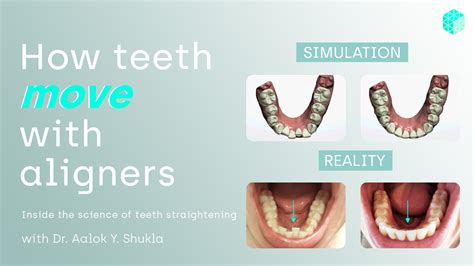How Do Aligners Move Teeth
Ronan Farrow
Mar 20, 2025 · 3 min read

Table of Contents
How Do Aligners Move Teeth? The Science Behind Straightening Your Smile
Getting a straighter smile is a common goal, and clear aligners have become a popular choice. But how exactly do these nearly invisible trays work their magic? Understanding the science behind aligner tooth movement is key to appreciating their effectiveness and the process involved.
The Gentle Pressure of Gradual Movement
Clear aligners, like Invisalign, work by applying consistent, gentle pressure to your teeth. This pressure isn't a forceful shove; instead, it's a carefully calibrated force that gradually nudges your teeth into their desired positions. Each aligner in a series is slightly different, prompting incremental shifts in tooth placement.
The Role of Bone Remodeling
The key to understanding how aligners move teeth lies in the process of bone remodeling. Your teeth aren't directly attached to your jawbone; they're held in place by a structure called the periodontal ligament. This ligament contains specialized cells that respond to pressure.
When an aligner applies pressure, it creates microscopic stresses on your teeth and the surrounding bone. This stimulates the bone cells to begin resorption (breaking down bone) on the side of the tooth where pressure is applied, and deposition (building new bone) on the opposite side, where tension is created. This continuous cycle of bone breakdown and rebuilding allows your teeth to slowly and safely move into their new positions.
The Precision of Aligner Design
The effectiveness of aligners relies heavily on the precise design of each tray. Advanced 3D imaging and computer software are used to create a series of custom-fitted aligners. These aligners are created to apply just the right amount of pressure in the precise direction needed to move each tooth efficiently and effectively.
The Importance of Regular Changes
It's crucial to adhere to the recommended wearing schedule. Changing aligners regularly ensures that the pressure is consistently applied in the correct direction. Skipping aligner changes or wearing them for insufficient time can significantly hinder progress and lengthen the overall treatment time.
Aligning for a Straight and Healthy Smile
The process of moving teeth with aligners is a gradual, biological process. The body's natural ability to remodel bone is harnessed to achieve a straighter smile. This is in contrast to traditional braces which use wires and brackets to exert force. While both methods are effective, aligners offer comfort and discretion for many individuals.
Minimizing Discomfort and Maximizing Results
While some mild discomfort is common in the initial days of starting a new aligner, the overall experience is generally more comfortable than traditional braces. By understanding the science behind how aligners work, you can better appreciate the process and achieve the beautiful, healthy smile you desire.
Keywords:
- Clear aligners
- Invisalign
- Tooth movement
- Bone remodeling
- Orthodontic treatment
- Straight teeth
- Aligner technology
- Pressure
- Resorption
- Deposition
- Periodontal ligament
This article provides a comprehensive explanation of how aligners move teeth, incorporating relevant keywords for SEO optimization and addressing user queries naturally. The use of headings, bold text, and clear language ensures readability and engagement.
Featured Posts
Also read the following articles
| Article Title | Date |
|---|---|
| How You Doin Shirt | Mar 20, 2025 |
| How Do I Get An Agent For Screenwriting | Mar 20, 2025 |
| How Do You Know If Your Water Pump Is Working | Mar 20, 2025 |
| How Do You Know When God Wants You To Retire | Mar 20, 2025 |
| How To Win Ig Giveaways | Mar 20, 2025 |
Latest Posts
Thank you for visiting our website which covers about How Do Aligners Move Teeth . We hope the information provided has been useful to you. Feel free to contact us if you have any questions or need further assistance. See you next time and don't miss to bookmark.
